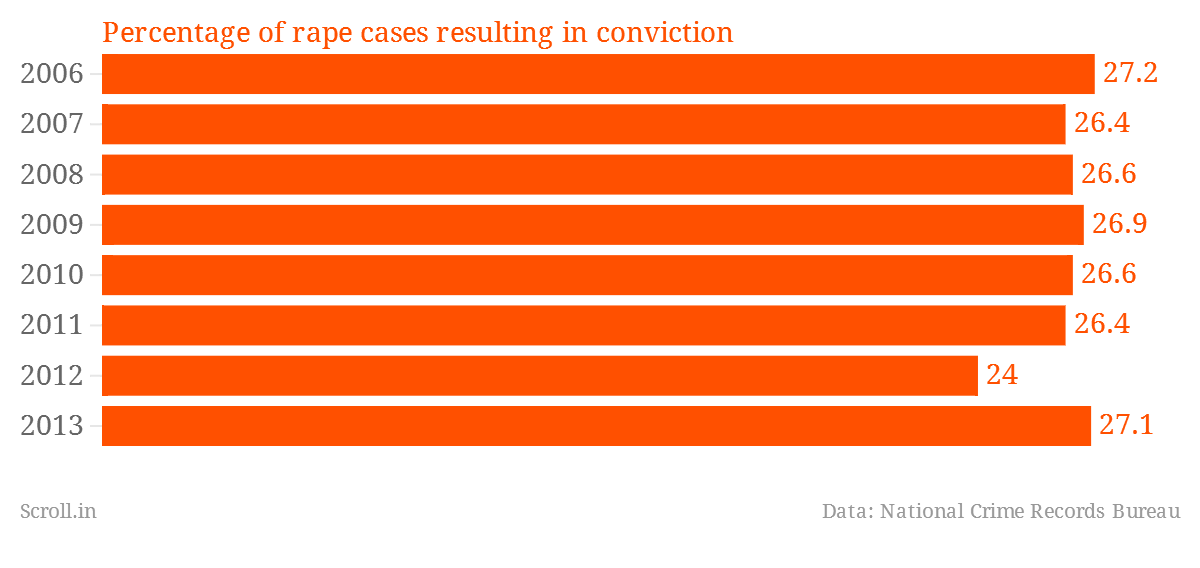The reporting of crimes against women rose discernibly in the year after the Delhi gang-rape in December 2012, as indicated by data released at the end of June by the National Crime Records Bureau.
According to the Bureau’s reports on crime in India, 27.2% of all rape cases tried in court in 2006 ended with convictions. In 2013, it was 27.1%.


In 2012, the NCRB changed its base of calculating rates of reported rape. It now calculates the rate of reported rapes per 1 lakh women and not 1 lakh of the entire population. This is why the rate of rape seems to have almost tripled from 2011 to 2013.

Higher reporting of rape is likely to indicate that the social stigma against sexual violence might be decreasing, and that affected citizens are more confident about getting justice from the legal system.
But it is also important to look beyond this data. Rape statistics rarely reflect reality. Rape is among the most under-reported crimes in the world, without even considering the factors peculiar to India that influence people from reporting sexual crimes.
Indian law does not recognise sexual violence against people who are not female or children, nor does it acknowledge the existence of marital rape.
There is immense social pressure against reporting rape, whether within a victim’s social or familial circle as well or at police stations, where officers regularly attempt to turn away survivors.
In 2013, The Hindu reported that the NCRB was undercounting crimes as a whole by only recording the principal offence of a first information report. Cases that involved rapes ending in death, for instance, were being recorded only as murders, not rapes.
Given all these factors, India’s rate of reported rape is expectedly far lower than that reported in other countries.
The United Nations Office on Drugs and Crime collected official data from 81 countries in 2010. The highest rates of reported rape in Europe and Africa were in Sweden and Botswana respectively.


These comparisons are not entirely representative. The UNODC itself acknowledges this, saying that caution must be exercised while comparing because of different legal definitions and methods of recording.
[This article has been updated to note that the NCRB changed its base of calculating rapes from per lakh population before 2011 to per lakh women from 2012 onwards. The percentage conviction for rapes in 2013 is 27.1, not 36.5.]
According to the Bureau’s reports on crime in India, 27.2% of all rape cases tried in court in 2006 ended with convictions. In 2013, it was 27.1%.


In 2012, the NCRB changed its base of calculating rates of reported rape. It now calculates the rate of reported rapes per 1 lakh women and not 1 lakh of the entire population. This is why the rate of rape seems to have almost tripled from 2011 to 2013.

Higher reporting of rape is likely to indicate that the social stigma against sexual violence might be decreasing, and that affected citizens are more confident about getting justice from the legal system.
But it is also important to look beyond this data. Rape statistics rarely reflect reality. Rape is among the most under-reported crimes in the world, without even considering the factors peculiar to India that influence people from reporting sexual crimes.
Indian law does not recognise sexual violence against people who are not female or children, nor does it acknowledge the existence of marital rape.
There is immense social pressure against reporting rape, whether within a victim’s social or familial circle as well or at police stations, where officers regularly attempt to turn away survivors.
In 2013, The Hindu reported that the NCRB was undercounting crimes as a whole by only recording the principal offence of a first information report. Cases that involved rapes ending in death, for instance, were being recorded only as murders, not rapes.
Given all these factors, India’s rate of reported rape is expectedly far lower than that reported in other countries.
The United Nations Office on Drugs and Crime collected official data from 81 countries in 2010. The highest rates of reported rape in Europe and Africa were in Sweden and Botswana respectively.


These comparisons are not entirely representative. The UNODC itself acknowledges this, saying that caution must be exercised while comparing because of different legal definitions and methods of recording.
[This article has been updated to note that the NCRB changed its base of calculating rapes from per lakh population before 2011 to per lakh women from 2012 onwards. The percentage conviction for rapes in 2013 is 27.1, not 36.5.]
Limited-time offer: Big stories, small price. Keep independent media alive. Become a Scroll member today!
Our journalism is for everyone. But you can get special privileges by buying an annual Scroll Membership. Sign up today!